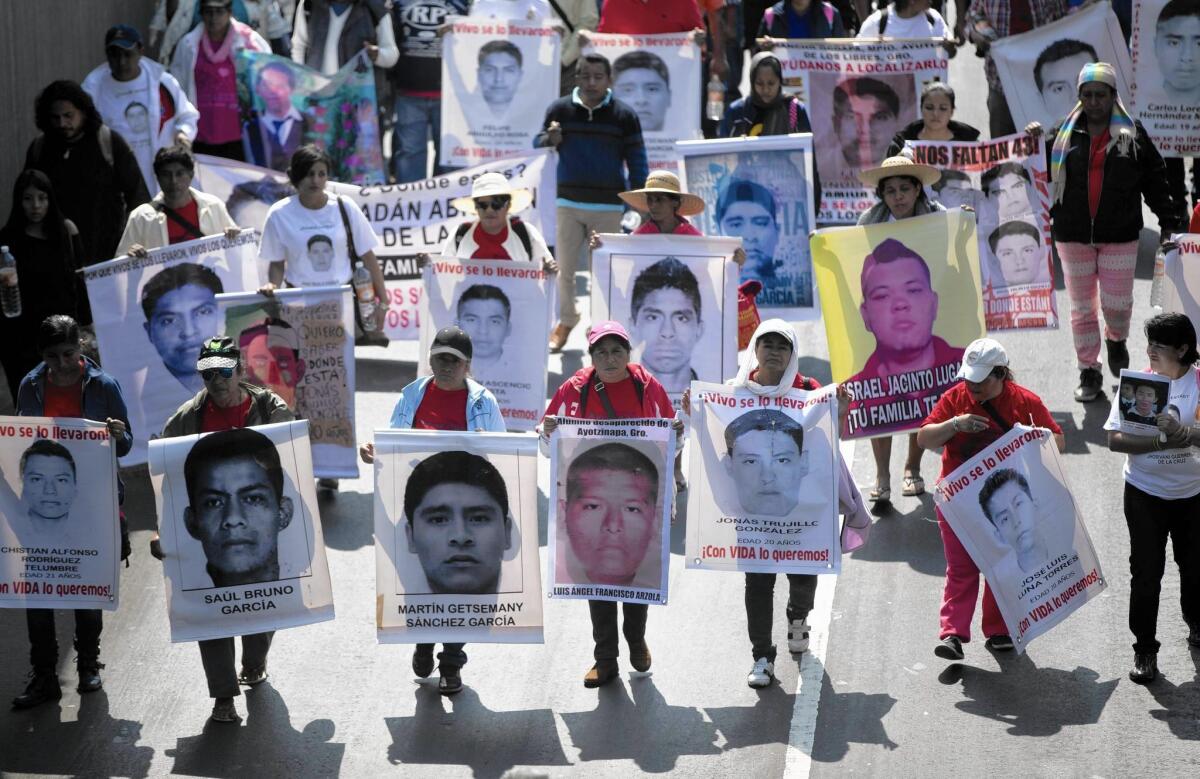U.N. panel presses Mexico’s government on civilian disappearances

- Share via
Reporting from Mexico City — A United Nations panel Friday said Mexico faced a widespread problem of disappearances of civilians at the hands of police and military, worsened by the government’s failure to investigate.
The committee singled out the kidnapping and presumed killing of 43 college students in the Mexican state of Guerrero last year as proof of “the serious challenges Mexico is facing in terms of the prevention, investigation and punishment for enforced disappearances and searching for the disappeared.”
More than 20,000 people have gone missing in Mexico in recent years, some of whose bodies later turned up in hidden mass graves but many of whom were never again heard from.
An “enforced disappearance” is when authorities are involved in or have permitted the abduction. Many of those missing in Mexico, including the 43 students, were last seen being taken away by police or military.
The Guerrero students were attacked by a cabal of corrupt politicians and police working with a vicious local drug gang, federal prosecutors have said.
After a series of hearings in Mexico and Geneva, the U.N. Committee on Enforced Disappearances issued its findings Friday in Geneva, linking a “context of generalized disappearances” in much of Mexico in part to government inaction.
It also noted “with concern” Mexico’s lack of precise information on the missing. Despite several pledges by the government of President Enrique Peña Nieto and his predecessor, Felipe Calderon, there is no public national database of the missing, nor a universally agreed-to number of victims.
“There is an apparent obvious discrepancy between the obligation of the state to punish and prevent this crime and its ubiquity in many parts of the country,” committee member Rainer Huhle told reporters in Geneva.
The committee called on Mexico to create a special prosecutor for disappearance cases and focus more energy and resources on such cases as part of a national phenomenon. It urged that every report of an illegally detained or abducted person be investigated “without delay” and that police or other authorities suspected in the crime not be involved in the investigation.
In responding to the report, the government said it would consider the recommendations. In its earlier testimony to the committee, the Mexican government argued that it respects human rights and has made good-faith efforts to investigate cases of disappearances, killings, extortion and other crimes plaguing the nation.
But many in Mexico, including human rights groups, say the government’s efforts have fallen woefully short, with numerous officials routinely ignoring the problem.
In the case of the 43 students, for example, Atty. Gen. Jesus Murillo Karam says the episode has been thoroughly investigated, nearly 100 suspects arrested, including police officers and politicians, and what he called the “historical truth” established: They were intercepted by police and handed over to drug gangsters who killed them, incinerated their bodies and tossed the remains in a river.
That conclusion has been challenged by the families and others, in part because the remains of only one student has been identified.
A renowned team of Argentine forensic specialists brought in at the families’ request to participate in the search also questioned Murillo Karam’s certainty, citing a string of “irregularities” in the investigation.
Those included broken chains of evidence with the remains, scientific questions about how 43 bodies could be so thoroughly burned and reports that some of the suspected killers were tortured into making confessions.
Parents of some of the 43 testified at the U.N. hearings in Geneva. One father, Bernabe Abrajan, said they were there “to really obtain justice” because, he said, “our government is not able to do anything.” He wore a T-shirt emblazoned with a photo of his missing son.
Several international and regional human rights organizations welcomed the U.N. panel’s findings and urged the Mexican government to pay attention.
The U.N. report “should be a wake-up call to the tragic disappearance of thousands” in Mexico, Amnesty International said in a statement.
More to Read
Sign up for Essential California
The most important California stories and recommendations in your inbox every morning.
You may occasionally receive promotional content from the Los Angeles Times.











